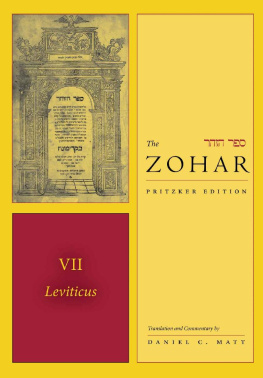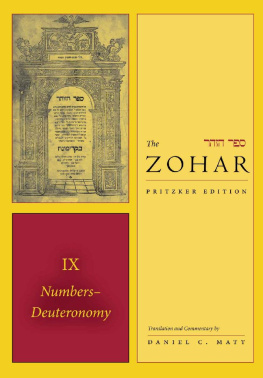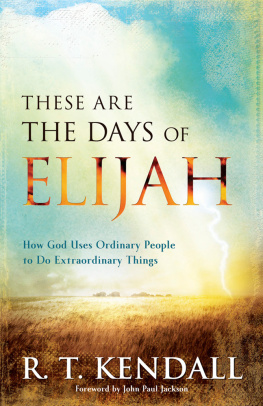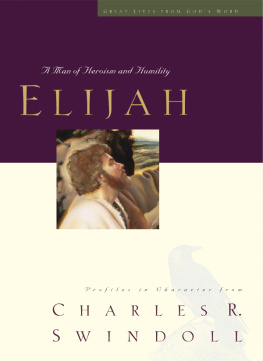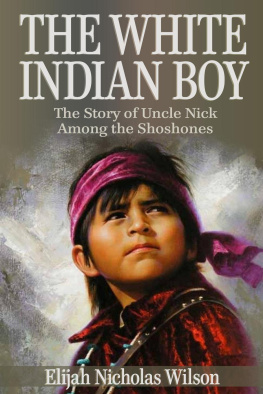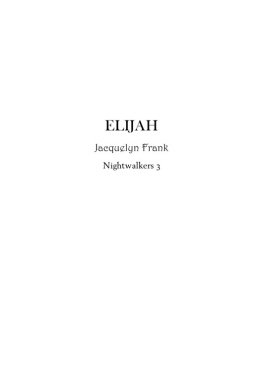BECOMING ELIJAH

Becoming Elijah
Prophet of Transformation

DANIEL C. MATT

Jewish Lives is a registered trademark of the Leon D. Black Foundation.
Copyright 2022 by Daniel C. Matt. All rights reserved. This book may not be reproduced, in whole or in part, including illustrations, in any form (beyond that copying permitted by Sections 107 and 108 of the U.S. Copyright Law and except by reviewers for the public press), without written permission from the publishers.
Yale University Press books may be purchased in quantity for educational, business, or promotional use. For information, please e-mail (U.K. office).
17)
Set in Janson Oldstyle type by Integrated Publishing Solutions.
Library of Congress Control Number: 2021942371
ISBN 978-0-300-24270-6 (hardcover : alk. paper)
A catalogue record for this book is available from the British Library.
This paper meets the requirements of ANSI/NISO Z39.48-1992(Permanence of Paper).
To the memory of my mother, Gustine Kanarek Matt, who passed away at the age of ninety-fiveas this book took final shape, and to my grandchildren, taking shape now:
Sara, Rebecca, Asher, and Raphael
His mystery is really the mystery of divinity spreading. Divine energy clothes itself in him, extending to the world... Elijah never appears in the world without the mystery of divinity revealing itself through him. The mystery of God on earth is the mystery of Elijah... The closest that divinity can possibly come to humanity is the mystery of Elijah.
Moses Cordovero, Or Yaqar
CONTENTS
ACKNOWLEDGMENTS
I WANT TO thank Steven Zipperstein for inviting me to contribute a volume to Jewish Lives, for stimulating my thinking about Elijah, and for offering valuable suggestions as I revised the book.
I have discussed Elijah with numerous people, some of whom I wish to thank here: Alan Block, Alan Godlas, Arthur Green, Melila Hellner-Eshed, Menachem Kallus, Ruth Kara-Ivanov Kaniel, Yehuda Liebes, Shlomo Naeh, Yehiel Poupko, Biti Roi, and George Savran.
Translations of biblical passages are shown in italics and are heavily indebted to Robert Alters The Hebrew Bible. Translations from other Hebrew (and Aramaic) writings are my own.
I want to thank the Stanhill Foundation for supporting my work.
Hana, my wife, has accompanied me throughout this journey, deepening my understanding and guiding me. My gratitude to her is overflowing; my love for her, boundless.

Introduction
HIS ELECTRIFYING NAME Eliyyahumeans YHVH is my God. Many Hebrew names include a divine element, but Elijah has two, an excess of divinity. In the biblical book of Kings, he lives his intense name. A zealous devotee, he is enraged by the idolatrous worship of Baal and Asherah spreading through Israel, promoted by King Ahab and especially by Queen Jezebel and her cohort of prophets. He seeks to purge the Israelites of this taint and restore their faith in the one true God, bringing them back beneath the wings of Shekhinah (the Divine Presence).
Empowered by his intimacy with YHVH, Elijah confronts Ahab and declares a devastating drought. After several years, by silent prayer, Elijah finally brings rain, but only after he champions YHVH by vanquishing the prophets of Baal on Mount Carmel, rousing throngs of Israelites to exclaim, YHVH, He is God; YHVH, He is God! (1 Kings 18:39).
The biblical Elijah is a miracle worker, promising a starving widow that her jar of flour and jug of oil will be wondrously replenished for as long as she needs. Soon afterward, he revives the womans lifeless child with divine help, after accusing God of having killed the boy. Twice he calls down fire from heaven: once to consume his sacrifice during the contest with the prophets of Baal, and later when he incinerates a hundred soldiers sent to apprehend him.
Immediately after defeating the false prophets on Mount Carmel, Elijahs zeal to extirpate idolatry impels him to slaughter them. Yet he can be zealous for human justice too, as when he condemns King Ahab to death for murdering an innocent man to expropriate his vineyard.
Elijah is fearless, fierce, and untameda hairy man, with a leather loincloth bound round his waist (2 Kings 1:8). The world, it seems, cannot bear him; finally, he is taken up to heaven in a chariot of fire.
His ascent may have been a spectacular, supernatural death; but the scriptural account is ambiguous, leaving open the possibility that Elijah endures, living forever. If so, couldnt he return to earth? He frequently does so in rabbinic literature, Jewish folklore, and popular imagination. In this scenario, Elijahs disappearance from the world marks the beginning of a new career, in which he is transformed. His outstanding quality is no longer zealotry but compassion. He helps the poor, rescues those in danger, defends Israel from its enemies, and will one day redeem the whole world by heralding the Messiah.
Because of Elijahs messianic role, Jews open the door for him at each Passover sederthe ceremonial meal that commemorates the liberation from Egyptian slavery and includes the hope for ultimate redemption. Similarly, every Saturday night around the world, as the Sabbath departs, traditional Jews chant: Eliyyahu ha-Navi (Elijah the prophet)!... May he come to us speedily with the Messiah, son of David!
In his case, the fierce biblical zealot turns into the most beloved, cherished figure in Judaism. In the Israel Folktale Archives (fittingly located in Haifa on Mount Carmel, site of the prophets triumph), there are more stories about Elijah than Moses, King Solomon, or anyone else. Over the centuries, the belief in his powers sustained the masses, while his inspiration enthused the mystics.
Whereas the biblical Elijah is a chastiser of Israel, the postbiblical Elijah is a benevolent savior. Undeniably, there are compassionate elements in his biblical personality and harsh elements in his later one, but it often seems there are two different Elijahs. What links them? Why does Elijah return to earth? How does the original figure become full-fledged?
To explore him we must begin, of course, with the biblical account. But how reliable is it? Some scholars contend that if he ever existed, Elijah was a charismatic holy man, purportedly able to bring rain, who lived in the time of King Ahab in the ninth century BCE. Gradually, legends were woven around him and then given literary form in the scriptural saga.
According to one view, the biblical tale of Elijah was composed to justify a coup against Ahabs son, King Jehoram, led by an army commander named Jehu. As the book of Kings records, Jehu assassinated Jehoram, had Jezebel thrown down from a window of her palace, and killed Ahabs descendants and then the prophets and followers of Baal. To legitimate this extermination, court scribes may have produced accounts of Elijah condemning Ahab and predicting Jehus rise to power and his slaughter of the idolaters.
Whether or not such speculation is correct, there are certainly legendary elements in the biblical cycle of Elijah stories. Over the following two millennia, Jewish folklore (in the Talmud, Midrash, and countless later tales) expanded his role and his powers. He became the protean prophet, capable of assuming numerous formsoften that of an old man, but also a young man, an Arab, a Roman official, a slave, and once (for a noble purpose) even a prostitute.
Next page

